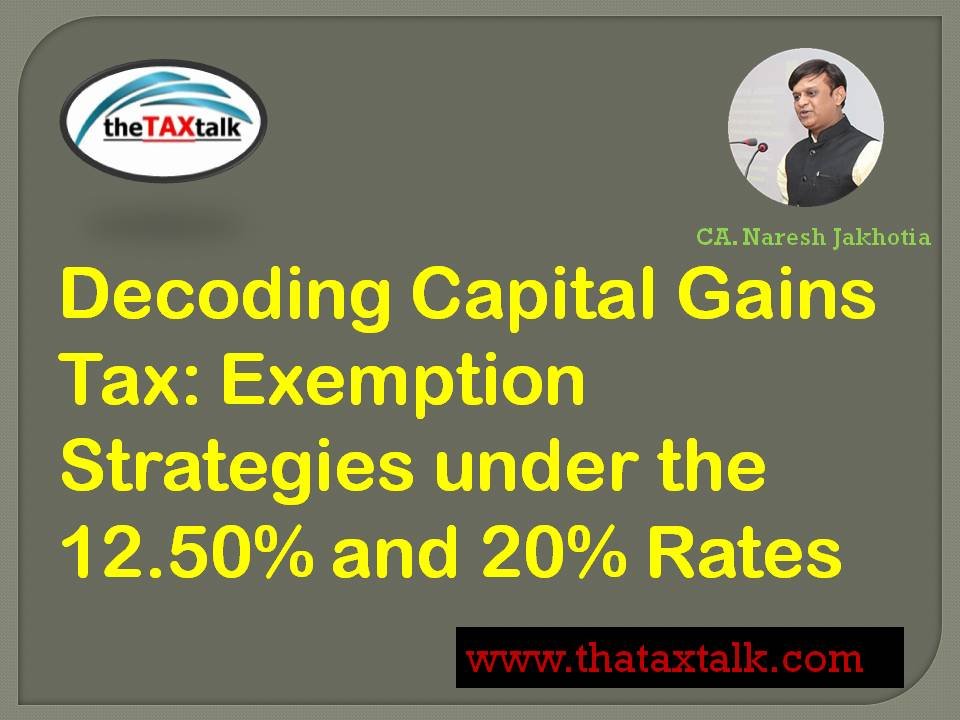![]()
Decoding Capital Gains Tax: Exemption Strategies under the 12.50% and 20% Rates
Every new tax law & amendments comes with a new set of concerns, challenges & tricky situations. One such amendment of the recent past is with regard to taxation of capital gains which has undergone substantial transformation and will have wider implications for all the categories of the taxpayers. Notably, those taxpayers who wish to claim an exemption from Long Term Capital Gain (LTCG) tax must now re-evaluate the provision as amended by the Finance Act -2024 (No. 2).
For individual and HUF taxpayers, the most commonly utilized provisions for capital gain exemption which are found in Section 54, Section 54F, and Section 54EC are outlined as under:
1. Section 54 & Section 54F:
Both this section offers exemption on the condition that the taxpayers invest the amount for purchase or construction of residential house property within a prescribed time frame, as under:
i] For purchase:
One year before or two years after the date of Sale/Transfer.
ii] For Constructions:
Three years from the date of Sale/Transfer.
2. Exemption U/s 54EC:
Taxpayers can save LTCG tax arising from sale of immovable property by making investment in the specified capital gain bonds within a period of 6 months from the date of transfer of capital assets.
[On a similar line, section 54B also offers capital gain exemption exclusively on purchase and sale of agricultural land].
Amendment with Regard to Capital Gain Taxation
LTCG tax on the sale of immoveable property acquired before July 23rd, 2024 by resident individual & HUF shall be lower of (a) tax computed @ 20% under the old scheme with indexation benefit or (b) tax computed @ 12.50% under the new scheme without indexation benefit.
Taxpayers will be liable to pay tax at lower of method (a) or (b) above. If the tax calculated @ 12.50% is higher than taxpayers may continue to offer the tax @20% by availing the indexation benefit.
Impact on Capital Gain Exemption:
Individual & HUF who are selling immoveable properties acquired before 23rd July 2024 are reasonably compensated by providing grandfathering clause. They have to pay the tax at lower of 20% with indexation benefit or @12.50% without indexation benefit. As a result, they are able to enjoy the benefit of both the world. However, the implication would also be required to be evaluated while claiming capital gain exemption. Let us understand it with an example.
Mr. Ram sold a house after 23rd July 2024 for Rs. 2 Crore, originally purchased a few years back for Rs. 30 Lakh. The indexed cost of the property is now, say Rs. 65 Lakh. In this case, the LTCG is Rs. 1.70 Cr if such person is opting to pay tax @12.50% (without indexation benefit) whereas it would be Rs. 1.35 Cr if the taxpayer is opting for the tax rate of 20% (with indexation benefit). Let us consider the tax implication under the following 2 Scenarios.
Scenario 1: If no plans to avail Capital Gain Exemption:
If Mr. Ram doesn’t have any plan to invest in any other assets for claiming capital gain exemption, his tax liability excluding cess would have been Rs. 21.25 Lakh in the first option @ 12.50% and Rs. 27 Lakh under the second option @20%. Clearly, the 12.5% rate is more favorable in this case.
Scenario 2: If planning to avail Capital Gain Exemption:
If Mr. Ram wishes to avoid paying tax by claiming a capital gain exemption, he would need to invest Rs. 1.70 Crore under the 12.50% option, whereas only Rs. 1.35 Crore would be required under the 20% option. The second option is preferable as it requires a lower investment to result in zero tax liability.
However, it may be noted that the beneficial choice would depend on the amount Mr. Ram intends to invest. Let us evaluate the options if Mr. Ram is investing say Rs. 45 Lakh, 60 Lakh, 75 Lakh and so on.
| Investment by Mr. Ram for Capital Gain Exemption | Taxable LTCG in 12.50% option | Taxable LTCG in 20% option | Tax @ 12.50% | Tax @ 20% | Which Tax Rate option is better |
| 4500000 | 12500000 | 9000000 | 1562500 | 1800000 | 12.50% |
| 6000000 | 11000000 | 7500000 | 1375000 | 1500000 | 12.50% |
| 7500000 | 9500000 | 6000000 | 1187500 | 1200000 | 12.50% |
| 7666667 | 9333333 | 5833333 | 1166667 | 1166667 | Neutral |
| 9000000 | 8000000 | 4500000 | 1000000 | 900000 | 20.00% |
| 11500000 | 5500000 | 2000000 | 687500 | 400000 | 20.00% |
| 13500000 | 3500000 | 0 | 437500 | 0 | 20.00% |
As demonstrated, the most advantageous tax rate depends on the amount Mr. Ram intends to invest in new assets. If the investment is less than Rs. 76.67 Lakh, the 12.50% rate is better, while the 20% rate is preferable for investments exceeding Rs. 76.67 Lakh.
Conclusion:
Every budget strives to simplify tax laws, but these efforts often have the unintended consequence of adding complexity. The recent changes in capital gains taxation, despite their intent to streamline the process have added further complications making it more challenging for taxpayers to make informed financial decisions. As we look ahead to the new Income Tax Law as promised in the next 6 months, let us hope that it will bring much-needed simplification to the tax landscape & will ensure consistency, clarity, and fairness in the taxation system.
[Views expressed are the personal view of the author. Readers are advised to seek professional advice before taking any decisions. Readers may forward their feedback & queries at nareshjakhotia@gmail.com. Other articles & response to queries are available at www.theTAXtalk.com]
The copy of the order is attached herewith:

